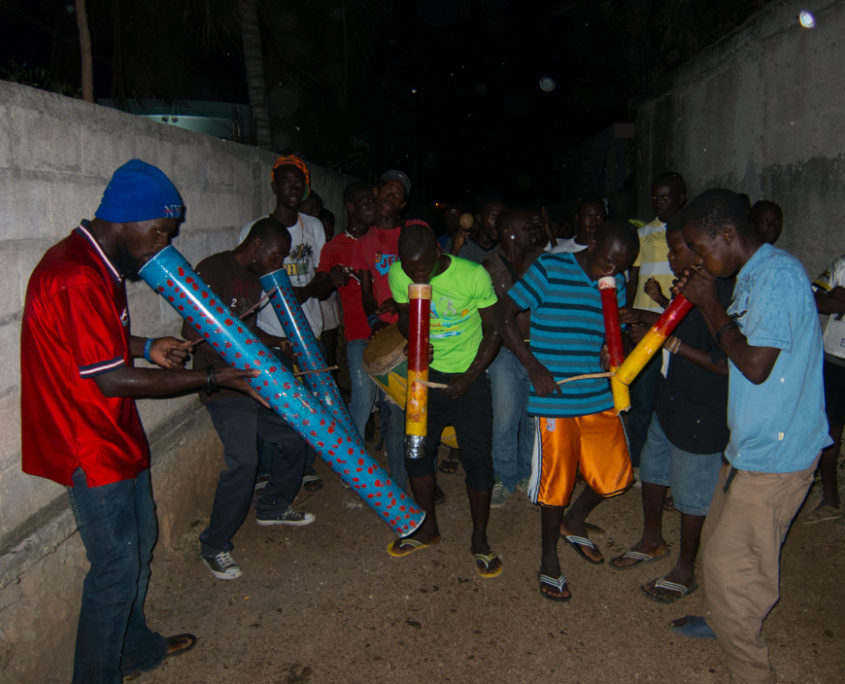L’Oraj of Dlope
L’Oraj is what cofounder Dumont Lebonheur describes as “a local rara.” It has had various names over the years and declined for a time, before being re-formed by Dumont and some friends in the late 1980s because they felt the neighborhood was let down, and much diminished since the demise of their rara band and festivities. Since then, however, L’Oraj has been reklame, claimed by a lwa or spirit who is now the master of the rara. Such spiritual adoption brings both constraints and exigencies. This story of the reforming of L’Oraj contains classic elements of the creation myth of many raras generally: some friends get together to have fun, play music, drink, and march, but before long the lwa, alerted by the energy and the drums and the rum, seize control and begin to set the terms. The rara becomes less of a diversion and more of an obligation. Now, bad things will happen if the rara fails to go out and march; its founders must fulfill an unwritten mystical contract.
In contrast to Laflè Modèl, an enterprise which seemed driven by force of Ronald Bellevue’s sense of family obligation and his annual mad scramble for the funds to make it possible, L’Oraj felt like an egalitarian, community enterprise. No one, I think, was paid for their participation. Women of three generations gathered around an outdoor sewing machine on the patio stitching red and yellow satin costumes while toddlers keenly watched the tightening of a goatskin drumhead.
(mouse over the images below for more about L’Oraj; listen to audio by following the soundcloud links on the right)
Audio from L’Oraj, of Dlope
In their tonel, before marching out, the core musicians of rara L’Oraj participate in a vodou ceremony, during which they and the rest of the marchers roll their pants up to the knee and are ritually bathed with herbs by the local houngan as protection against any evils they might encounter. It is a ritual girding, meant in part to prepare the rara to do hypothetical battle with other raras they may meet on their route:
L’Oraj perform a Bat Bwa in front of a local merchant’s shop. A Bat Bwa is a mark of respect, a pause in the parade to salute a dignitary or important person in the neighborhood. Usually a small contribution is requested; sometimes the rara is contracted in advance to stop at a particular place and “bat bwa” for someone. In this case, the shopkeeper handed over a few half-pint bottles of rum to “fuel the engine,” and the rara went on its way:
Several hours into a long march, rara L’Oraj conjures a trance-inducing mood in this chaotic, polyrhythmic segment, recorded along the main road east of Jacmel. Whistles marshal the players, cars are heard honking until they are given space to pass, the kolonel cracks his whip to inspire the descent of the lwa, and when all seems to be descending into disarray, clapping re-energies and re-aligns the performers. This is music as an organic manifestation of community, music that seizes a life of its own, distinct from any individual impulse.


